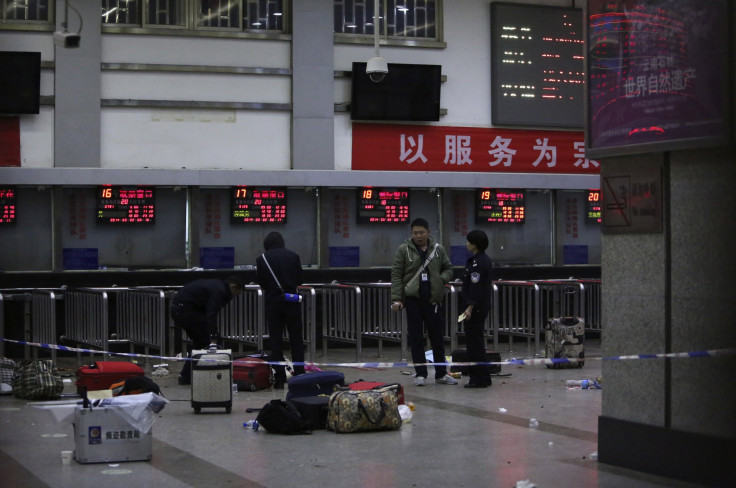Three Get Death For China Train Station Attack

(Reuters) - A Chinese court sentenced three people to death and one to life in prison on Friday for an attack at a train station that triggered a sweeping crackdown on what Beijing calls militant violence.
The government said knife-wielding militants from the western region of Xinjiang launched a premeditated attack in March at the Kunming station in the southwestern province of Yunnan, in which 31 people were killed and 141 injured. Police shot dead four of the attackers.
China's leaders have vowed to strike hard at religious militants and separatist groups, which they blame for a series of violent attacks in Xinjiang, the traditional home of the Muslim Uighur ethnic minority.
State television showed the four suspects - three men and one woman - sitting in court in Kunming, watched over by police dressed in black.
The court announced the sentencing on its official microblog, naming the four defendants, all of whom are Uighur, to judge by their names.
"Today's trial clearly shows the resolute attitude and staunch determination of the Chinese government to protect the life, property, security and joint interests of all ethnicities, and severely strike at violent terrorism crimes," the Kunming Municipal Intermediate People's Court said.
Iskandar Ehet, Turgun Tohtunyaz and Hasayn Muhammad were sentenced to death for leading a terrorist organization and intentional homicide. The fourth defendant, Patigul Tohti, was jailed for life for taking part in the attack as well as intentional homicide, because she was pregnant at the time of her detention.
Patigul Tohti was shot and wounded by police at the station, while the other three were arrested a few days before the attack while trying to flee the country, the court said.
In total, eight people were involved in the plot, though only five carried out the attack, it said.
The eight were "influenced by extremist religious thinking" and began meeting in December to plan the attack, the court said. Five more people were involved in forming their terror group, a case which is being handled separately, it added.
HAIR SALON PLOT
The group planned the attack in a hair salon in Gejiu city, also in Yunnan, and made black jihadi flags, the court said.
One of the group played videos and audio tracks of overseas militant groups training and carrying out attacks, in order to learn how to kill people, it added.
Some of the people who were attacked, as well as relatives of the dead, were in court, it said.
Courts in China are controlled by the ruling Communist Party, making it unusual for those accused of crimes - particularly in politicized cases - to have a fair trial.
On Thursday, China's top prosecutor called for swifter trials of "terrorists, religious extremists and makers of firearms and explosives".
The Kunming attack was one of the single deadliest incidents attributed by the government to militants. A suicide bombing in May killed 39 people at a market in Xinjiang's capital, Urumqi.
Xinjiang, resource-rich and strategically located on the borders of central Asia, is crucial to China's growing energy needs. Analysts say most of the proceeds from the sale of its resources have gone to majority Han Chinese, stoking resentment among Uighurs.
Exiled Uighur groups and human rights activists say the government's repressive policies in Xinjiang, including controls on Islam, have provoked unrest. Beijing denies that.
Hundreds of people have died in unrest in Xinjiang in the past 18 months or so, the government says.
Officials have said the attackers had tried to leave the country across its porous southern border to wage holy war, but human rights groups say Uighurs, who are often prevented by the government from getting passports, attempt to flee persecution in China.
"Under a hopeless situation where they could not leave the country and at any time faced the threat of arrest, China should take the main responsibility for promoting policies of hostile repression that triggered this incident," Dilxat Raxit, spokesman for the exiled group, the World Uyghur Congress, said in an emailed statement.
© Copyright IBTimes 2024. All rights reserved.





















